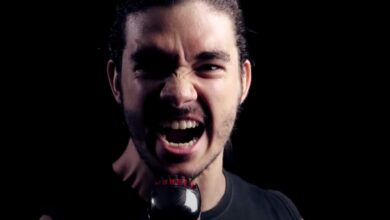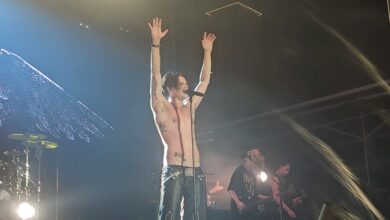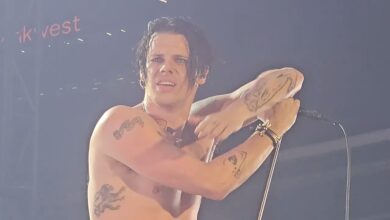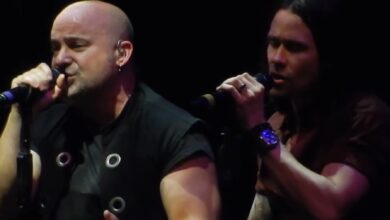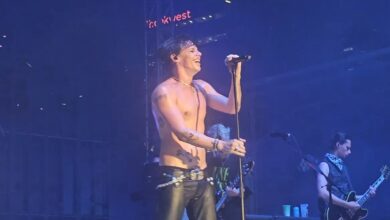Ann Wilson Stuns Audience with Powerful ‘Dream On’ Performance at Hampton Beach
On August 18, 2021, Ann Wilson brought her solo tour to the Hampton Beach Casino Ballroom in New Hampshire, turning a storied seaside venue into a cathedral of rock balladry. The house ran a no-opener, two-set format and hit an 8 p.m. downbeat, giving fans a full-evening showcase designed for deep cuts, towering covers, and the kind of long-form dynamics that venues like the Ballroom were built to reveal.
She arrived with the Amazing Dawgs—Tom Bukovac on lead guitar, Tony Lucido on bass, Paul Moak on guitar and keys, and Sean Lane on drums—a seasoned unit calibrated for contrast: glass-delicate intros, piston-tight grooves, and explosive codas. Their mandate that night was simple and audacious: reimagine classics with respect and fresh voltage, then let Wilson’s voice write the last word on every arrangement.
“Dream On” sat deep in Set 2, placed like a keystone between a velvet-edged Queen moment and the serrated rush of “Barracuda.” The setlist itself told a story—how a 1973 piano-born lament could be lifted, half a century later, by a different icon and a different band, yet still hit the bloodstream with the same slow-burn inevitability before the room erupted in recognition.
There is documentary proof of what happened when the vocal entered. Professionally filmed video from this exact Hampton Beach date captured Wilson’s interpretation of Queen, The Who, Aerosmith, and Led Zeppelin—the material that framed the arc of the night and, crucially, preserved the tone color and ferocity she brought to “Dream On.” It’s not hearsay; it’s on tape, with the room’s air still in the microphones.
She was seventy-one years old—born June 19, 1950—and sang with the authority that comes from carrying songs for decades without letting them calcify. Age here wasn’t a qualifier; it was a credential. The lower register came like smoke from a banked fire, the belts were focused rather than forced, and the signature ascents felt earned, not borrowed.
Hampton Beach Casino Ballroom, roughly a 2,200-capacity room with a long history of rock milestones, served as a perfect acoustic lens. The space is intimate enough for diction and vibrato to matter, yet large enough for sustained notes to loft and hang. You could hear the natural decay tail a heartbeat longer, just enough to let a phrase land like a final brushstroke.
The show’s design helped. Two discrete sets—with no changeover chaos—meant the band could shape dynamics with intent. The first half teased textures and lineage; the second half delivered catharsis. That programming let “Dream On” arrive as a narrative pivot, not a novelty, and the audience responded the way good rooms always do: with silence in the verse and a tidal surge at the chorus.
Arrangement choices were precise rather than precious. The Dawgs kept the piano-born DNA intact through interlocking guitar voicings and warm keyboard pads, giving Wilson a resilient bed to float over. Drum accents pushed the pre-chorus forward while the bass stayed glued to the vocal phrasing, so when the famous final climb arrived, it felt less like a stunt and more like gravity releasing its hold.
Wilson treated lyric lines as lived sentences, not merely syllables to crest on. The first verse came conversational, almost conspiratorial; consonants were clipped tight, vowels lengthened like thread pulled through fabric. By the time the climactic passage arrived, the tone hardened into gleaming steel, riding open-throated belts that were powerful yet centered—no waver, no splay, just line and light.
Context mattered, too. The encore leaned unapologetically into Zeppelin, with “Going to California” and “Black Dog” saluting Heart’s lifelong dialogue with that canon. This wasn’t mimicry; it was fluency, the kind that lets a singer inhabit “Dream On” without apology, then pivot to Page-Plant architecture as if moving from one room to another in the same house.
Elsewhere in the set, bookends from Heart’s own history—“Crazy on You,” “Straight On,” “Even It Up”—were rendered with modern muscle but classic contours. A mid-show Queen moment (“Love of My Life”) recalibrated the room’s oxygen, letting the subsequent Aerosmith ascent feel both inevitable and newly dangerous. The sequence wasn’t accidental; it was dramaturgy done with guitars and lungs.
The night also served as a status report on Wilson’s 2021 solo run, a series of dates that threaded theaters and casinos instead of cavernous arenas. That choice proved wise. Songs like “Dream On” reward close-quarters truth—the kind you can’t fake when the front row is twenty feet away and the mic captures every grain in the voice. Hampton Beach was exactly that kind of proving ground.
If you track the setlists from that week, a pattern emerges: reverence without rigidity. The Who’s “Won’t Get Fooled Again” snarled with fresh teeth; Lennon’s “Isolation” read like a letter from a parallel year; and the Aerosmith classic stood tall among them, not merely as a tribute but as a test. Wilson didn’t pass it; she set it.
The performance lives online in fan and pro-shot form, but even high-quality captures can’t fully bottle what the room felt when her top-line opened up on the final refrain. What they do preserve is intent: the phrasing choices, the breath pacing before the leap, the rifleshot lock of the band on the last downbeat. That’s the record—evidence for anyone who doubts what happened there.
In the end, “Dream On” at Hampton Beach read like a signature without a period—an artist at seventy-one writing her name across a song born in another voice and another city, and making it feel both inevitable and brand-new. Call it lineage, call it mastery; either way, it sounded like time itself standing still long enough to listen.

